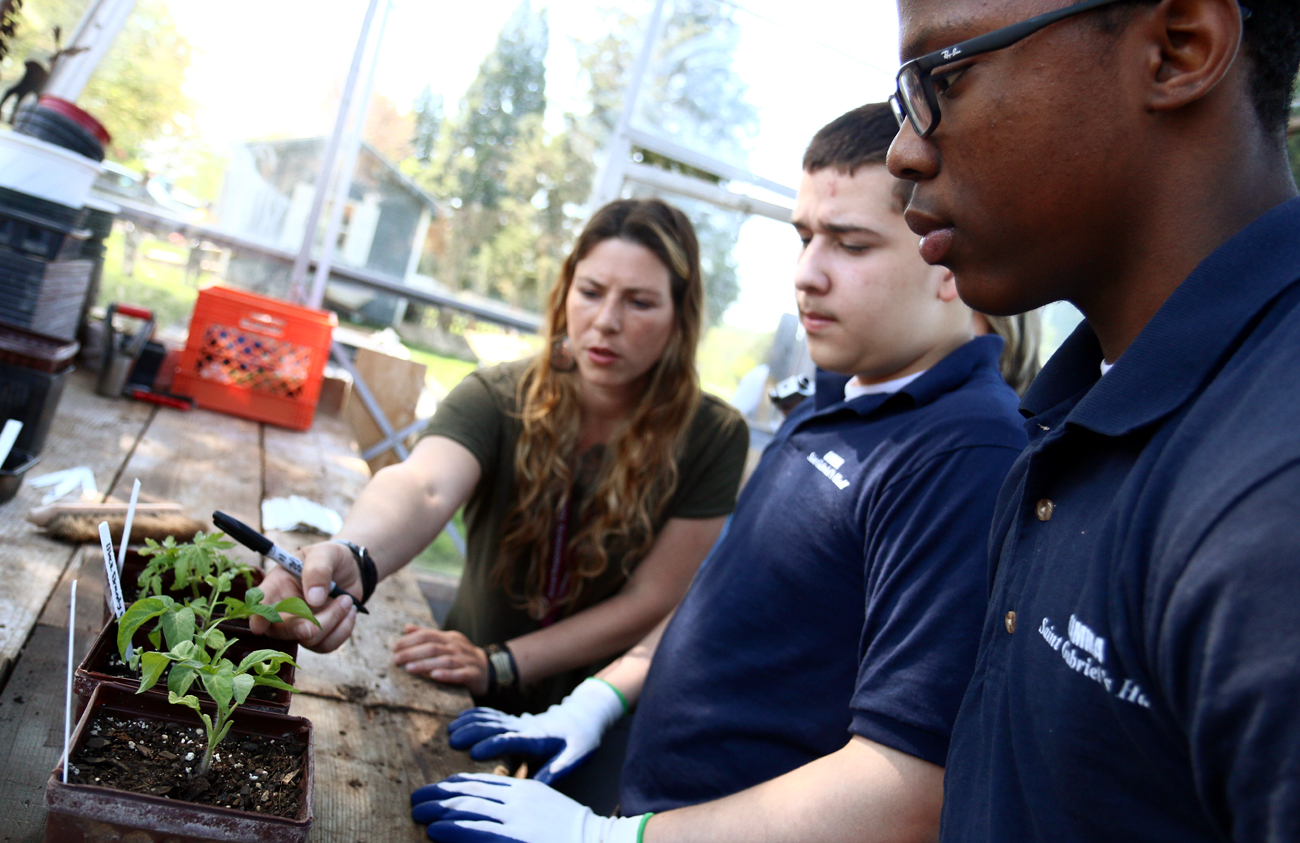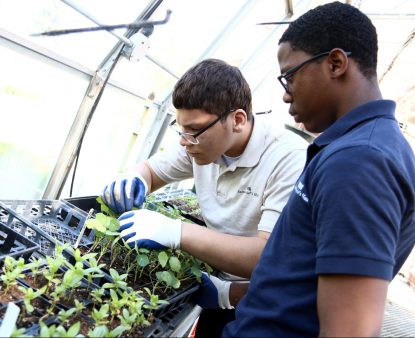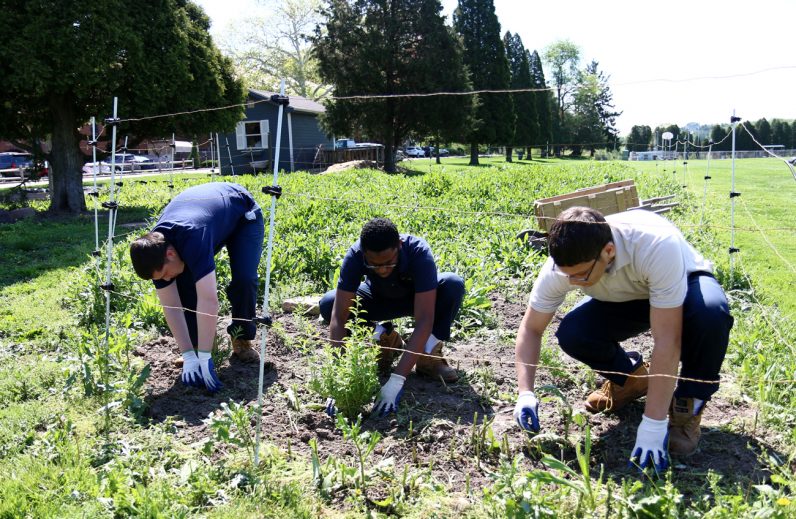
Andrea Farra, a horticultural studies instructor at St. Gabriel’s Hall, guides students Nelson (center) and Mark in preparing plants for sale. Now in its 10th year, the program offers career training and life-skills to the school’s at-risk youth. (Photo by Sarah Webb)
Years ago, a Christian Brother planted a patch of day lilies at St. Gabriel’s Hall, a residential treatment program for adjudicated youth located in Audubon.
Today, those same plants are blooming — along with cantaloupes, chives, tomatoes, gourds and goji berries — thanks to a horticultural training program at the school, which is part of St. Gabriel’s System, a division of archdiocesan Catholic Social Services (CSS).
[hotblock]
“Our greenhouse is an antique structure that was used to start Longwood Gardens,” said principal John Mulroney. “We found it on eBay at a great price.”
Now in its tenth year, the horticultural program prepares young men for careers in gardening and landscaping. The initiative is one of four career technical education (CTE) modules offered at St. Gabriel’s, a Middle States accredited facility in which 143 young men between the ages of 11 and 18 are now enrolled. The other three CTE tracks offer instruction in culinary arts, building maintenance and construction, and Microsoft Office systems.
Students in the horticultural program gain hands-on experience through a range of groundskeeping tasks on St. Gabriel’s extensive campus, which includes a sanctuary garden for meditation, several plant beds and sweeping lawns.
(Watch a video on the horticultural training program at St. Gabriel’s Hall:)
Back in the classroom, the horticulture students review botany and plant propagation, while completing a basic Occupational Safety and Health Administration (OSHA) safety course required for a wide range of jobs.
The youth in the program are also trained in small engine maintenance and repair.
“I make sure they know how a four-stroke engine works versus a two-stroke, and how to clean the air filters and spark plugs so they can use power tools,” said instructor Andrea Farra, who trains approximately 60 students per year.
A biologist and magna cum laude graduate of Alvernia University, Farra is a self-described “super tomato nerd” who actively cultivates heirloom varieties, which are bred with considerable care by smaller farms. Because they are not mass-produced or hybridized, heirlooms tend to be more flavorful, and they are often preferred by chefs, including those in the kitchens at St. Gabriel’s Hall.

Victor (left) and Mark, students in the horticultural program at St. Gabriel’s Hall, inspect plants during a weekly class. The program combines career training and life skills for youth at the school, which is part of archdiocesan Catholic Social Services. (Photo by Sarah Webb)
“I also make sure we grow plenty of basil and other herbs for our kitchens,” Farra said. Plans to develop a full farm-to-table gardening operation are under discussion with culinary arts instructor Eileen Hasty and school chef Malcolm Cain.
In addition to serving its own, the horticulture program seeks to enhance the local community. As part of their service requirements, St. Gabriel’s students have traditionally helped to maintain the grounds at Valley Forge National Historical Park and at the John James Audubon Center at Mill Grove.
Now, Farra is working with the Audubon Center — located a stone’s throw from St. Gabriel’s — to create an educational partnership that would foster native flora and fauna.
“We’ll help them grow the plants, and then also add them into our sanctuary garden,” said Farra. “And they’re going to do a workshop each week starting this summer to teach the boys the importance of native plants, and how they feed and shelter birds.”
For many of the youth, all of whom are from Philadelphia, both St. Gabriel’s Hall and its horticultural program are a gateway to a world of green.
[tower]
“It was definitely a change coming out here, because we’re so used to hearing the police sirens, and the ambulance is always going by,” said Victor, now in 11th grade. “It’s so different to come out here, to be outside and work in the garden, where all you hear is just birds and stuff.”
The natural setting “makes you gather your thoughts and relaxes you,” said Nelson, a ninth grader who hopes eventually to purchase a farm in the Dominican Republic.
Gardening also imparts valuable lessons, such as patience, responsibility and an appreciation for living things.
“This is the first time I’ve ever grown plants, and the difficult part is not pressing down or pushing too tightly,” said Mark, a 10th-grade student. “You put the soil in, and you have to give it some space and time to let the roots grow.”
Farra also noted that the program instills a strong work ethic that encourages collaboration.
“I hold them to a high standard,” she said. “They’ve got to work together on a lot of our projects — for example, if they’re carrying something heavy and they have to work with somebody else. I purposely assign them partners for jobs.”
That teamwork also helps the students cope with frustration and failure.
“We’ve had things go wrong, because gardening is always a gamble,” said Farra. “And when it happens, I’ve noticed that they try to cheer each other up. And we just persevere and move forward.”

Students Nelson, Mark and Victor weed the garden at St. Gabriel’s Hall, an archdiocesan Catholic Social Services school for at-risk youth. (Photo by Sarah Webb)
PREVIOUS: Archbishop Chaput ordains six new priests for Philadelphia
NEXT: Catholic Social Services offers spiritual retreat for women in transition



Share this story